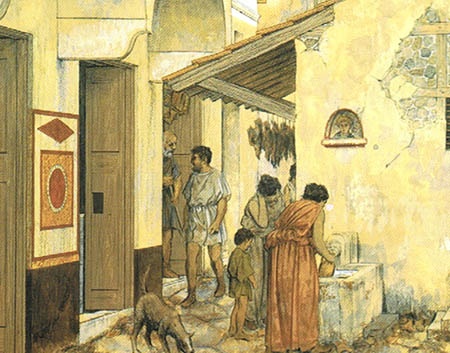Segment 7a: Introduction.
7a 介紹
In this lecture, we do our best to get into the heads of the ancient Romans,
這節課,我們要學習古羅馬的首領
and move to the Roman way of making war.
以及羅馬發動戰爭的方法
The similarities between Roman and American civilization are interesting.
羅馬和美國文明之間的相似之處非常有趣
For example, both societies are characterized by theoretical equality,
例如,羅馬和美國都有理論上的平等
when in fact both societies were under the rule of elderly, wealthy males.
事實上,這兩個社會都處于年長富有的男性統治下
But then the differences
這兩個社會之間的差異
are pretty interesting as well.
也很有趣

For example the Roman state religion was almost devoid of what we would call real spiritual content.
例如,羅馬的國教幾乎沒有真正的精神內涵
Segment 7b: Mos Maiorum,
7b 祖先的道路
way of our elders examines
先人的方式構成了
the two underlying principles of Roman society.
羅馬社會中兩個基本原則
First is the Patria Potestas; power of the father,
第一個是Patria Potestas
which replicated itself in Roman politics, economic life and even religion.
家父權,在羅馬政治經濟甚至宗教中一再重復這一點
I smell an essay exam question.
這可能是在考試時是個問答題
Second is the fixation upon the mos maiorum,
第二個是固定沿襲mos maiorum
way of our elders, which the Romans held up as the measure of all proper conduct.
祖先的道路,羅馬人認為這能衡量全部合適的行為
Essay question.
問答題
The Romans took these two principles very seriously.
羅馬人很重視這兩項原則
But the foundation of the Roman Republic contradicted them both.
但是羅馬共和國的基礎和這兩項都沖突
The break from monarchy was itself
脫離君主制本身就是
so drastic a deviation from the mos maiorum,
偏離了祖先的道路
because Rome had never had elective government before.
因為羅馬之前從未有過選舉產生的政府
Moreover, the election of completely new magistrates every year made two men,
而且這種審判官的選舉每年任命兩個人
called consuls, into the father figures of the Roman state every year.
稱作consul 擔任羅馬城邦的領導者
Fortunately, for the Romans,
幸運的是,對羅馬人來說
they more often than not recognized when a change from the mos maiorum was in fact necessary.
他們認為改變父輩們的做法是必要的
Segment 7c: The Roman State Religion
7c 羅馬的國教
cuts into the heart of what the ancient Romans did and did not believe.
侵犯了古羅馬人心中信仰和不信仰的東西
The Romans started out worshipping formless spirits called numina.
羅馬人開始信仰無形體的精神,稱為numina
But through Etruscan and Greek influence,
但是通過伊特魯利亞人和希臘的影響
the Romans came to visualize their gods
羅馬把他們的神形象化
and goddesses in human form,
有了人類的形態
for example, their supreme god Jupiter.
例如,至高無上的神朱庇特
Yet, the Roman deities didn't really care about the Roman's moral conduct.
但是,羅馬的神靈并不在乎羅馬人的道德行為
The Romans didn't believe their gods and goddesses
羅馬人不相信他們的神
interfered in their lives,
會干涉他們的生活
unless they were persuaded or bribed to do so.
除非受到勸說或者賄賂
To the Romans, prayer was a social contract.
在羅馬人看來,起到是社會契約
The deity was rewarded, if and only if he or she did what the mortal asked.
神得到了禮物前提是神完成了凡人的請求
Oh Lord, would you give me a Mercedes-Benz.
主啊,賜我一輛奔馳吧
And if you don't give me a Mercedes-Benz,
如果你不賜給我奔馳
then I don't give you anything either.
那我就不會給你任何供奉
Roman religious rituals were complicated to the point of being utterly ridiculous.
羅馬的宗教儀式很繁瑣甚至都到了完全可笑的地步
At the same time, the Romans state's well being
同時,羅馬城邦國的安全繁榮
depended on the exact performance of these rituals in accordance with the mos maiorum.
完全依賴這些宗教儀式符合前人的做法
So these ridiculous rituals would be performed over and over and over again,
因此,這些可笑的儀式要一遍遍地舉行
until they were done correctly.
直到整個過程沒有紕漏
In segment 7d: Wars and Peaces,
7d 戰爭和和平
we examine some of the major reasons for the Roman's military success.
我們探索羅馬取得軍事勝利的一些原因
First, every Roman citizen was automatically a soldier,
第一,每個羅馬公民都是天生的戰士
which was a great source of civic pride.
這是公民自豪的源泉之一
The Romans also had the concept of the ius fetiales,
羅馬也有 ius fetiales這個概念
or the just war which specified that Rome should only fight defensive battles.
也就是指定羅馬只能打防衛型的戰爭
Roman gods and goddesses would not support aggressive territory grabbing.
羅馬眾神不會支持侵略性的領土搶奪戰











